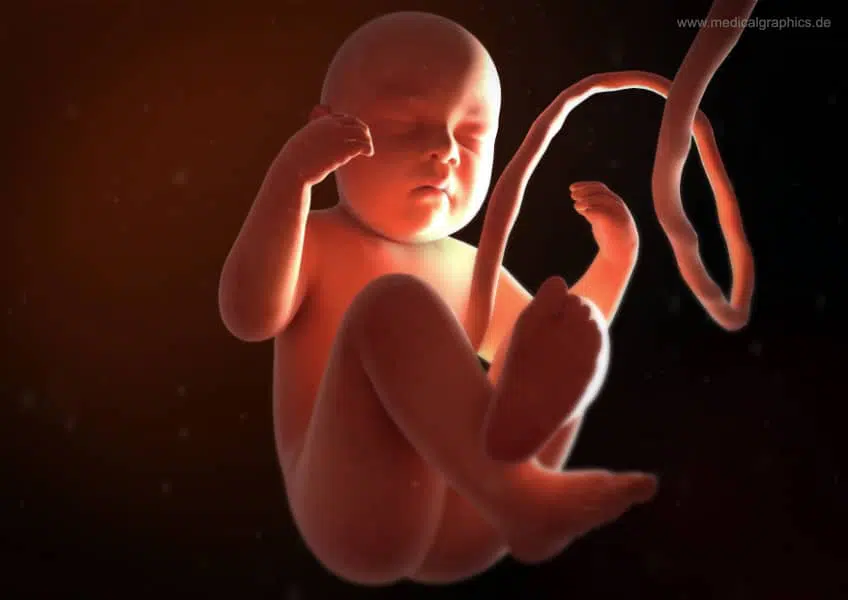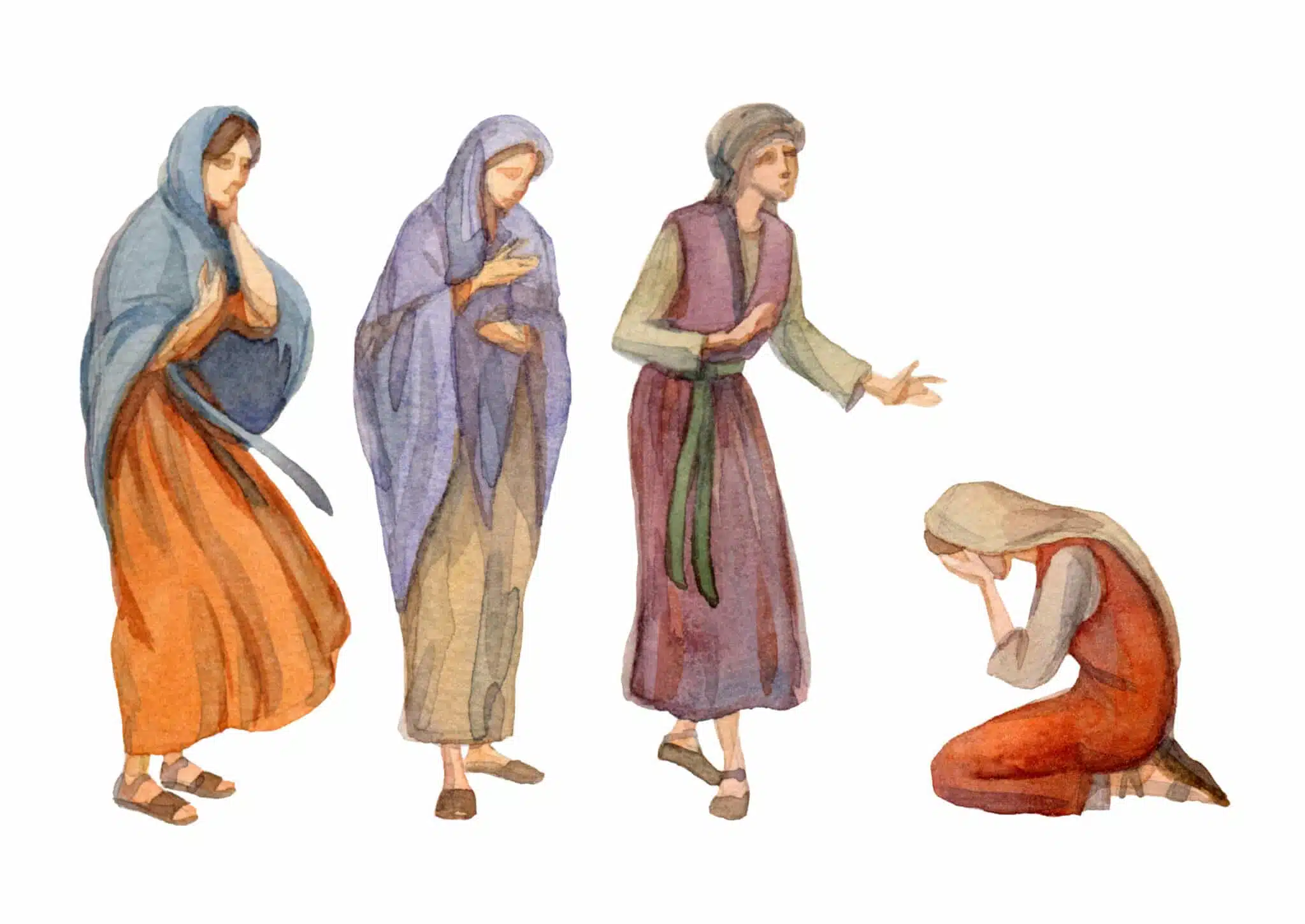Pro-abortionists sometimes claim that there is nothing forbidding abortion in the Bible. For example:
- Ex-priest Daniel C. Maguire says, “There has been no systematic thinking in Jewish Christian tradition on abortion. There is nothing in the Bible on it.”1
- Roy Bowen Ward, Professor Emeritus of Comparative Religion at Miami University of Ohio, writes, “One thing the Bible does not say is ‘Thou shalt not abort.’”2
- Mark Bigelow, a member of Planned Parenthood’s Clergy Advisory Board, writes, “One thing I know from the Bible is that Jesus was not against women having a choice in continuing a pregnancy. He never said a word about abortion (nor did anyone else in the Bible) even though abortion was available and in use in his time.”3
So, what are pro-life Christians to make of the “Bible and abortion” argument?

The Argument Doesn’t Hold
The statement that abortion is not explicitly mentioned in the Bible is technically correct. However, this allegation falls prey to the logical fallacy of assuming that because an act is not mentioned in Scripture, the Bible therefore approves of that act. After all, Scripture does not name other evils specifically, such as carjacking or phone hacking. Does this mean that Christians should not oppose these evil acts either?
Of course not! Christians use what the Bible teaches about good and evil acts and apply it to their everyday lives. To take the above examples, in the time that the Bible was written, carjacking or phone hacking were not familiar terms. However, the Bible does condemn stealing. If we accept that theft is evil and apply it to our own lives, we would in turn condemn these actions, as well.
We can apply this same principle to abortion. While the word “abortion” itself does not appear in the Bible, we can take the Bible’s teachings on murder, pregnancy and childbirth, and the value of children to ascertain what the Bible would say about abortion.
Even Outside of the Bible’s Teachings, Abortion is Wrong
Most people can agree that we should defend defenseless and innocent human beings. Even from a purely scientific and logical standpoint, we can see that the unborn child is undoubtedly a human being. From the moment of conception, the zygote (AKA – a newly formed baby) contains all the genes necessary to form DNA – half from the mother, and half from the father. This occurs even before implantation!
If one does not find this convincing, fetal development proves the blastocyst, zygote, embryo, and fetus are human with human souls. This is clear when one considers that, left alone (assuming no complications occur), the blastocyst will develop into the human baby that is born 9 months later. It’s not as if the blastocyst, zygote, or embryo is first non-human, but suddenly becomes human when they become recognizable as a human child.
We can even use mere logic to discover the “clump of cells” is human. If the blastocyst, zygote, etc., is not a human being, the mother is not pregnant. If this is the case, it makes no sense that months later, a human baby is born.
Science and logic tell us that the unborn child is human. And, as we will see below, the Bible also holds the unborn child is human. Thus, the Bible’s teachings on respecting life and prohibiting murder apply to the unborn child.
A great tragedy of abortion is that the unborn child feels pain, yet they are completely incapable of defending themselves. Another tragedy that is often overlooked is post-abortion syndrome and the abortion-breast cancer link. Pro-abortion protesters often say, “women deserve better.” And they are right. Women deserve better than an operation that kills their child and puts them at an increased risk of long-term mental and physical health issues. Women deserve better than to be lied to.
This is why pro-abortionists have such difficulties when they are confronted with atheist or agnostic pro-lifers who argue solely from the scientific point of view.4
Pro-abortionists generally base their opinions on neither science nor religion, but mere feelings. As MSNBC host Melissa Harris-Perry said: “When does life begin? I submit the answer depends an awful lot on the feeling of the parents.”5 And, when asked what a preborn baby feels when it is being killed by abortion, abortionist Michael Ballard replied, “Oh, I think that depends on your philosophy.”5
The Bible and Abortion
Even so, pro-lifers can easily point to the Bible to support their position.
There are many sins that the Bible condemns implicitly, or indirectly. For instance, the commandment “thou shalt not kill” certainly applies to sins such as the indiscriminate bombing of civilians or deliberately hitting someone with a car, though these are not specifically mentioned in the Bible. How, then, may we know that the Bible indirectly condemns abortion by means of laying down principles?

- To begin with, the Bible repeatedly condemns the killing of the innocent, i.e., the sinless (Jeremiah 7:6 and 22:17, Psalm 106:37-38, Proverbs 6:16-19, Isaiah 53:6, Luke 17:2 and Matthew 18:10,14).6 A preborn child is obviously innocent of any crime or actual sin, because he or she cannot possess the intent of doing evil. Pro-abortionists sometimes justify abortion by casting the preborn child in the role of an “aggressor.” This is illogical, because aggression requires conscious intent.
- Second, the Bible teaches that human life, created and nurtured by God, is present in the womb of the woman from the very beginning.
- Psalm 139:13,15 praises God: “For thou didst form my inward parts, thou didst knit me together in my mother’s womb….my frame was not hidden from thee, when I was being made in secret, intricately wrought in the depths of the earth.
- “Furthermore, God personally named and honored seven men before they were even born. These seven are Ishmael (Genesis 16:11); Isaac (Genesis 17:19); Josiah (1 Kings 13:2); Solomon (1 Chronicles 22:9); Jeremiah (Jeremiah 1:5); John the Baptist (Luke 1:13); and Jesus Himself (Matthew 1:21).7
- Third, all authentically religious people agree that God opens and shuts the womb and infuses the human body with a soul. There are more than a dozen Biblical references referring to this.8 This means that God certainly intended to create a human life, and we have no right to interfere with His will regarding its creation. God does not act randomly or without reason, despite what some abortion advocates allege.9 He creates every child for a purpose. Psalm 127 specifically refers to children as a “gift of the Lord” and as a “reward.” We do not have the right to disrupt or destroy His plans. Abortion is a supremely arrogant act because it imposes a creature’s will over God’s. In essence, it’s “playing God.” Is this not the definition of all sin ― stubbornly refusing to do God’s will for our lives?

Image courtesy of www.MedicalGraphics.de (CC BY-ND 4.0)
The conclusion is inescapable. The Bible condemns the killing of the innocent; preborn children are innocent; and human life is present from fertilization, as willed by God. Therefore, the Bible also condemns the killing of preborn children.
No other honest or logical conclusion is possible.
What About Verses that Seem to Support Abortion?
Some verses in the Bible seem to allude to abortion. Anti-lifers will point to these verses and misinterpret the true meaning, making it seem as though the Bible – and even God Himself – support abortion.
Let’s take a look at some of these misinterpreted verses.
Exodus 21:22-3
“If men quarrel, and one strike a woman with child, and she miscarry indeed, but live herself: he shall be answerable for so much damage as the woman’s husband shall require, and as arbiters shall award. But if her death ensue thereupon, he shall render life for life.”
In this verse, pro-abortionists argue that the unborn child is seen merely as property. They point to the fact that there is simply financial reparation for someone causing a miscarriage, whereas when the woman dies, the aggressor’s life will be taken. However, the original Hebrew word that here is translated as “miscarry” does not fully capture the meaning of the original Hebrew, which is often used in the Bible to refer to living things coming forth. Stand to Reason outlines it well:
“The relevant phrase in the passage, ‘…she has a miscarriage…,’ reads ‘w?yase û ye ladêhâ’ in the Hebrew [sic]. It’s a combination of a Hebrew noun, yeled, and a verb, yasa, and literally means ‘the child comes forth.’ The NASB makes note of this literal rendering in the margin.
The Hebrew noun translated ‘child’ in this passage is yeled4 (yeladim in the plural), and means ‘child, son, boy, or youth.’5 It comes from the primary root word yalad,6 meaning ‘to bear, bring forth, or beget.’ In the NASB yalad is translated ‘childbirth’ 10 times, some form of ‘gave birth’ over 50 times, and either ‘bore,’ ‘born,’ or ‘borne’ 180 times.
The verb yasa7 is a primary, primitive root that means ‘to go or come out.’ It is used over a thousand times in the Hebrew Scriptures and has been translated 165 different ways in the NASB—escape, exported, go forth, proceed, take out, to name a few. This gives us a rich source for exegetical comparison. It’s translated with some form of ‘coming out’ (e.g., ‘comes out,’ ‘came out,’ etc.) 103 times, and some form of ‘going’ 445 times.”

The articles goes on to quote multiple verses where the same word, yasa, is used to refer to living things. In essence, this means that when Exodus 21:22-3 says “miscarry,” the actual meaning is much more nuanced. Rather, it can be translated as referring to an induced labor.
Thus, this verse can otherwise be translated as: “If men quarrel, and one strike a woman with child, and the living child comes forth […]” This word, yasa, upholds the personhood of the unborn child, even though the punishment for this action is not as severe.
Nevertheless, there is still some ambiguity about what exactly this word refers to. Namely, whether it be a miscarriage or induced labor where the child is otherwise unharmed. However, the chapter goes on to state: “Eye for eye, tooth for tooth, hand for hand, foot for foot, burning for burning, wound for wound, stripe for stripe” (Exodus 21:24-5). Thus, we can infer that, should the child die, the husband would “render life for life,” according to the harm the man has caused the husband’s family.
Indeed, Josephus – an early Church historian and commentator on the Bible – held that this verse describes a situation that could infer the death of the child. In this case, Josephus says that this verse condemns causing the death of an unborn child and considers it murder.
Additionally, the Didache – a text of the early Church – asserts that Christians are forbidden to commit abortion. Along the Didache, there are multiple other early Church writings that forbid abortion, including the writings of Sts. John Chrysostom, Peter, and Basil the Great.

Numbers 5:11-31
These verses refer to a ritual where a woman accused of adultery will be tested by swearing an oath and drink the “bitter waters.” If she is guilty, “…the malediction shall go through her, and her belly swelling, her thigh shall rot: and the woman shall be a curse, and an example to all the people. But if she be not defiled, she shall not be hurt, and shall bear children” (Numbers 5:27-8).
Two things are important to note when considering this story. First, having this test of fidelity in place was a protection for women in a time when women would be assumed guilty if accused of adultery. Often, this would mean putting her to death. Because of the context of the time, giving women a chance to prove their innocence helped protect them from husbands who were overly suspicious or sought their demise.
Secondly, some point to this verse and assert this depicts an abortion. In fact, this verse has nothing to do with an abortion. What is described here is not an abortion. Instead, it’s a physical manifestation of her guilt, and it is a punishment for the sin of adultery. (For more information on this verse, click here.)
Jeremiah 44:7
“And now thus saith the Lord of hosts the God of Israel: Why do you commit this great evil against your own souls, that there should die of you man and woman, child and suckling out of the midst of Juda, and no remnant should be left you.”
Some pro-abortionists point to this verse to try to disprove the sanctity of life, claiming that God doesn’t value unborn life (or born life, for that matter) in this verse. Indeed, such a curse is unimaginable. But that is exactly the point of the verse. God is warning Israel the evil of and consequences for worshipping false idols. He doesn’t want people to sin, and He does not want them to suffer; thus, He gives them the warning for what their sins cause.
This is vastly different than a woman who chooses to abort her child, thus “playing God.”

Conclusion
Abortion is not supported by the Bible. In fact, the value and worth of human life – including unborn children – is frequently and repeatedly outlined. To say that the Bible supports abortion is to take a misinterpretation of verses and use them out of context.
God is consistent. As outlined above, God values and loves unborn human life. He does not value some unborn babies and not others. He knew and loved us before He created us. What right do we have to determine which babies live and die?
“Choose life, therefore, that you and your descendants may live” (Deuteronomy 30:19).
This article was originally published June 2020 by Dr. Brian Clowes, and most recently updated July 2023 by Marisa Cantu.
+ Endnotes
[1] Daniel C. Maguire, quoted in Janice Hughes. “The Catholic Constituency: What Church Leaders Don’t Tell Congress.” Conscience, May/June 1988, pages 2 and 10.
[2] Roy Bowen Ward. “Is the Fetus a Person? The Bible’s View.” Mission Journal, January 1986.
[3] Mark Bigelow, letter to Bill O’Reilly of Fox News, November 22, 2002.
[4] See the website of the Atheist and Agnostic Pro-Life League (AAPL).
[5] Interview of abortionist Michael Ballard by Mike Levy. Triumph Magazine, March 1972, pages 20 to 23 and 44. Quoted in Donald DeMarco. Abortion in Perspective. Hayes Publishing Company, 1974.
[6] The Bible specifically condemns child sacrifice in Leviticus 20:2-5; Leviticus 18:21; 2 Kings 23:10; and Jeremiah 32:35. Also see Deuteronomy 27:25 and 30:19; Amos 1:13; Jeremiah 7:6 and 22:17; Psalm 106:37-38; Proverbs 6:16-19; Isaiah 53:6; Luke 17:2; and Matthew 18:10,14.
[7] See especially Psalm 139:13-16; Isaiah 44:24 and 64:8; and Jeremiah 1:5. Additionally, St. Paul rejoices that God “set me apart before I was born” (Galatians 1:15).
[8] See specifically Genesis 29:31; 30:2,22; 49:25; 1 Samuel 1:5; Job 31:15; Psalm 139:13; Isaiah 44:2,24; 49:1,5; 66:9; Jeremiah 1:5; Luke 1:15;41-44; Wisdom 7:1; and Sirach 49:7.
[9] A CFFC pamphlet entitled “Did You Know that Most Catholics Believe in Reproductive Freedom?” states, “We believe that women should not be the victims of random fertility” [as if pregnancy bears no relation whatever to sexual activity]. “The Catholic hierarchy is trapped in an outdated authoritarianism which denies full equality to women and regards sex as evil.”
Marjorie Reiley Maguire has said, “The voice of the officers of the Catholic Church on reproductive matters speaks to me of a materialistic God…whose greatest joy comes from playing cruel reproductive tricks on women and watching them squirm” (Marjorie Maguire, quoted in Phyllis Zagano. “The Limits of Choice.” National Catholic Register, October 12, 1986).







Chapter 1 of Luke’s Gospel makes a convincing case for the sanctity of life in the womb. Elizabeth (filled with the Holy Spirit) is able to discern that the (newly conceived) child in Mary’s womb is her Lord — the long awaited Messiah. Remarkably, even John (six months in the womb) leaps for joy at the sound of the voice of Mary. (Joy is the happiness experienced by a person when they recognize they are living in the presence of their all Loving God.)
Verse 1:13 Do not be afraid Zechariah …. your wife Elizabeth will bear you a son, and you shall call his name John.
Verse 1:15, “And he will be filled with the Holy Spirit, even from his mother’s womb.”
Verse 1:26, “In the sixth month the angel Gabriel was sent from God to ….. Mary.
Verse 1:35 “The Holy Spirit will come upon you, and the power of the Most High will overshadow you; therefore the child to be born will be called holy, the Son of God.
Verse 1:36 “And behold, your kinswoman Elizabeth has also conceived a son; and this is the sixth month”
Verse 1:38 “Behold, I am the handmaid of the Lord; let it be to me according to your word.”
Verse 1:39 “Mary arose and went with haste …. to a city of Judah, and she entered the house of Zechariah and greeted Elizabeth.
Verse 1:41 And when Elizabeth heard the greeting of Mary, the child leaped in her womb: and Elizabeth was filled with the Holy Spirit and she exclaimed with a loud cry, “Blessed are you among women, and blessed is the fruit of your womb! And why is this granted me, that the mother of my Lord should come to me? For behold, when the voice of your greeting came to my ears, the child in my womb leaped for joy.”
Job 3 verse 16 tells us that a child in the womb is an “infant” not a mass of cells. If I were to argue with an abortion – rights person, I would ask them if their mother believed in abortion. If they answered yes, the next question is how they are standing there screaming in my face.